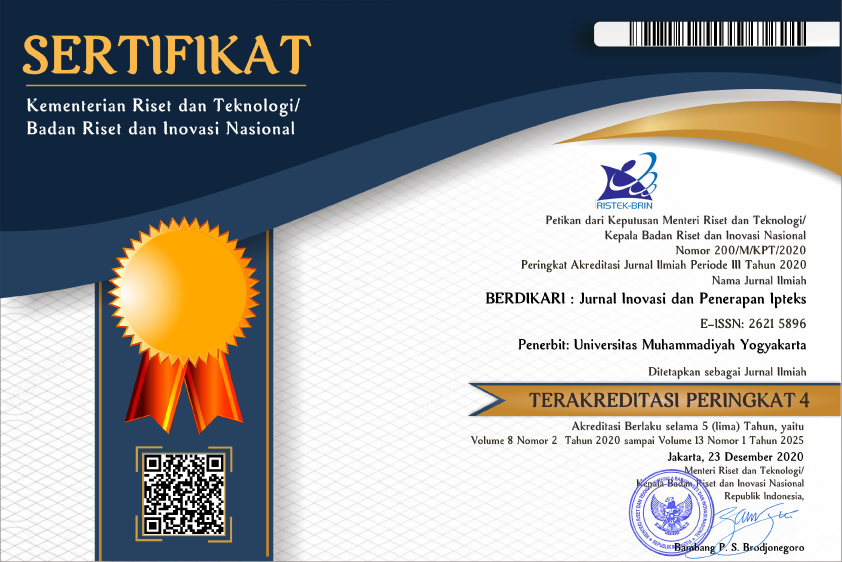Pengorganisasian dan Pengelolaan Sampah di Pantai Jimbaran
DOI:
https://doi.org/10.18196/berdikari.v10i2.11327Keywords:
empowerment, garbage, Jimbaran beachAbstract
The garbage on Jimbaran Beach poses a serious ecological problem because it causes pollution and has disrupted beauty and health. Jimbaran Village Beach is a beach tourism area that needs to be managed properly, considering that tourist visits have started to increase so that the potential for waste disposal is also increasing. This service activity seeks to (a) raise awareness and the active role of the community in environmental conservation and (b) increase community self-reliance through waste management. The solutions and methods applied are participatory. The community, as the main actor in healthy environmental action, processes waste into products of economic value. The results of service activities show the formation of community mindsets and behavior in waste management based on the 3R concept (reduce, reuse, and recycle). Waste is processed into organic fertilizer with the help of waste processing equipment. The community becomes skilled in processing organic waste into fertilizer that can be used in the agricultural industry.
References
Agustriawan, Deni. (2018). Pembuatan Kerajinan Berbasis Sampah Sebagai Implementasi Pengendalian Sampah 3R (Reduse , Reuse dan Recycle).
Darmawi, Ahmad. (2017). Potensi Timbulan Sampah Pada Objek Pariwisata Baru di Kabupaten Bantul Yogyakarta. Jurnal Penelitian Teknologi Industri Vol 9 No. 1 Juni 2017”.
Dhiniati, Fameira. (2018). Pendampingan Pengelolaan / Penyuluhan Sampah (3r) Kabupaten Manna. Jurnal Pengabdian Masyarakat” Vol 1 No 1 2018.
Saputro, Y.E. 2015. “Pengelolaan Sampah Berbasis Masyarakat Melalui Bank Sampah
Setianingrum, Reni. Pengelolaan Sampah dengan pola 3R untuk memperoleh manfaat ekonomi bagi masyarakat : Fakultas Hukum Universitas Muhammadiyah Yogyakarta. Undang- Undang Nomor 18 tahun 2008 tentang pengelolaan sampah
Suryani, S. (2014) Peran Bank Sampah dalam Efektivitas Pengelolaan Sampah (Studi Kasus Bank Sampah Malang). Aspirasi vol 5 no 1 juni.
Downloads
Published
Issue
Section
License
Copyright
Authors retain copyright and grant BERDIKARI Jurnal Inovasi dan Penerapan IPTEK the right of first publication with the work simultaneously licensed under an Attribution 4.0 International (CC BY 4.0) that allows others to remix, adapt and build upon the work with an acknowledgment of the work's authorship and of the initial publication in BERDIKARI Jurnal Inovasi dan Penerapan IPTEK.
Authors are permitted to copy and redistribute the journal's published version of the work (e.g., post it to an institutional repository or publish it in a book), with an acknowledgment of its initial publication in BERDIKARI Jurnal Inovasi dan Penerapan IPTEK
License
Articles published in the BERDIKARI Jurnal Inovasi dan Penerapan IPTEK) are licensed under an Attribution 4.0 International (CC BY 4.0) license. You are free to:
- Share — copy and redistribute the material in any medium or format.
- Adapt — remix, transform, and build upon the material for any purpose, even commercially.
This license is acceptable for Free Cultural Works. The licensor cannot revoke these freedoms as long as you follow the license terms. Under the following terms:
- Attribution — You must give appropriate credit, provide a link to the license, and indicate if changes were made. You may do so in any reasonable manner, but not in any way that suggests the licensor endorses you or your use.
- No additional restrictions — You may not apply legal terms or technological measures that legally restrict others from doing anything the license permits.




